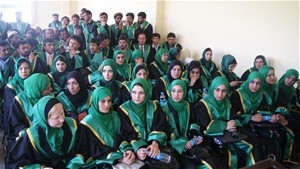
Young women of the Judicial Stage program’s 2011 graduating class will enter a workforce where only eight percent of the country’s judges are women.
USAID/RLS-F
Women students excelled at Afghanistan’s judicial training program
22 AUGUST 2011 | KABUL, AFGHANISTAN
As a result of war and government instability, judicial training has been sporadic and largely inaccessible to women, with only 26 classes graduating over the 43-year history of the country’s Judicial Stage program. With USAID assistance, in May 2011, 140 students graduated from the Supreme Court’s Judicial Stage program, qualifying them to work as judges in courts throughout Afghanistan. As a whole, the 24 women in this year’s graduating class performed exceptionally well, taking nine of the top ten class positions.
First established by the Supreme Court in 1968, the Judicial Stage program has operated for 26 years providing advanced courses and practicums for graduates seeking to become judges and is modeled on the French system of judicial training. In 2010, the Judicial Stage program was expanded from a one to two-years in order to provide increased substantive training and practical skills to its graduates.
This year’s top student and commencement ceremony speaker Nafisa Abdul Ali, who is awaiting news of her judicial placement, recounts, "In school, we studied many legal subjects, but never practically. With the Stage program, we learned not just what civil procedure laws are, but also how to apply them. For instance, the provisions of the civil code are especially difficult to understand. Thanks to the training materials of the Stage program, it became clear how provisions of the civil code are interpreted in various cases. This is an essential understanding for me to have as a judge."
With the support of USAID, Afghanistan’s judicial training program has seen a 50 percent rise in the number of applications for admission in the past three years, showing an increased interest in and respect for formal justice institutions among young graduates from university law and shari’a faculties and madrassas.
Though only eight percent of judges are female in Afghanistan’s male-dominated judiciary, women now make up more than 20 percent of current Judicial Stage students. USAID assistance for increasing women’s enrollment in the Judicial Stage program helps to foster equality and diversity in the judicial system and works to expand the cadre of women who are ready to serve in courts throughout Afghanistan.







Comment
Make a general inquiry or suggest an improvement.